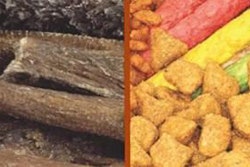Isoenergetic substitution of dietary corn oil for carbohydrates enhances growth in rabbits. It was hypothesized that identical amounts of metabolizable energy in the form of corn oil are more effective than those of carbohydrates in reducing protein catabolism, thus sparing it for growth, which would imply that the fat effect is greater on a marginal than normal protein diet.
Young growing rabbits were fed semi-purified diets either relatively high (21.6 energy % protein) or low in casein (13.0 energy % protein) to which extra corn oil (21.1 instead of 5.3 energy %) was added at the expense of an isoenergetic amount of corn starch and dextrose. The addition of corn oil to the diet with 21.6 energy % protein indeed increased weight gain, but the addition to the diet with 13.0 energy % protein left weight gain unchanged.
These results refute our hypothesis, because the low-protein intake did not limit growth. The enrichment of the high-protein diet with extra corn oil did not affect nitrogen retention, while urinary nitrogen excretion was increased. These observations contradict the idea that additional fat would spare nitrogen for growth.
Source : A. Alhaidary et al., 2010. Inter-related effects of dietary fat and protein level on growth performance in rabbits. JAPAN online August 2010. doi: 10.1111/j.1439-0396.2010.01044.x
















